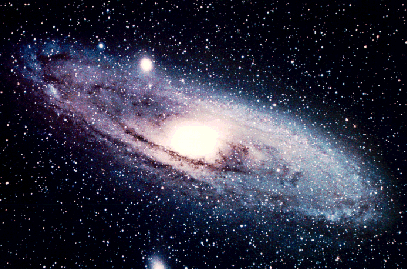
The Cosmological Argument

"If there weren't a God, then how come we exist?"
This question is ambiguous; it could mean either (i) or (ii).
(i) If not for God, what is the point of existence?
(ii) If not for God, what is the cause of existence?
These are separate questions. For (i), see the Teleological Argument and the Axiological Argument; for (ii) -- the Cosmological Argument -- read on.
The rhetorical question (ii) can be transformed into the following explicit argument.
(a) Everything that exists has a cause.
(b) The universe as a whole exists.
(c) Therefore the universe as a whole has a cause.
(d) That cause would have to be God.
(e) Therefore God exists.
Objection 1: The PSR is dubious
Premise (a) is known as the Principle of Sufficient Reason. It needs to be distinguished from (a'):
(a) Everything that exists has a cause.
(a') Every effect that exists has a cause.
While (a') is an analytic and necessary truth that follows from the concepts of cause and effect, (a) makes a substantive claim. Even if it were true, how would anyone know it? If it seems intuitively plausible to you, it might simply follow from ordinary experience where every thing is in fact an effect. But as for the universe as a whole, there's no evidence that it is the effect of anything else.
Even if the universe is the effect of something else, this would not be a necessary truth that logically follows from premises (a) and (b). For plenty of alternative possibilities are conceivable. According to one theory, the universe has an uncaused origin. According to other theories, there's no origin at all.
First, the universe may have grown out of a random ripple in non-existence; occasionally cosmos may spontaneously emerge from chaotic nothingness, so to speak (a view taken seriously by Taoism and by contemporary physics). Reply
Second, the universe in its present state might be the result of a series of causes stretching infinitely back in time. Reply
Third, time might be looped (by analogy to space being curved): perhaps at the "end" of time, the universe collapses in a Big Crunch, out of which comes the Big Bang and the "beginning" of the universe. I am not suggesting an endless series of different universes, nor an endless series of the same universe repeatedly recurring; rather I am suggesting numerically one universe happening once, but temporally configured so that its "end" causes its "beginning". The analogy is to curved space. The universe is spatially finite, and yet there is no edge or boundary. If you sailed in any direction you would eventually arrive back where you left. Similarly for time: I am suggesting a temporally finite but unbounded universe. If you could somehow survive long enough, you would eventually come back to now.
Objection 2: Granting the PSR does not support theism
Even if the universe has a cause, it does not follow that the cosmic cause is a creator, a person-like being with consciousness, beliefs, desires, purpose... It could just as well be a blind, impersonal, cosmic force. In other words, even if (c) happens to be true, (d) does not follow from it.
Objection 3: Granting the PSR does support atheism
While theists use the Principle of Sufficient Reason against atheism, atheists can just as well turn the table. "If everything that exists has a cause, and if God exists, then God has a cause -- call it SuperGod. (And SuperGod then must have a cause, SuperDuperGod, ad infinitum.) But if there is an infinite hierarchy of gods then theism (meaning monotheism) is mistaken." In sum, the Principle of Sufficient Reason backfires on theism. Theists and non-polytheistic atheists both have motivation to reject it. Reply
References
For a debate between theist and atheist, see William Lane Craig & Quentin Smith's Theism, Atheism & Big Bang Cosmology (Oxford, 1991).